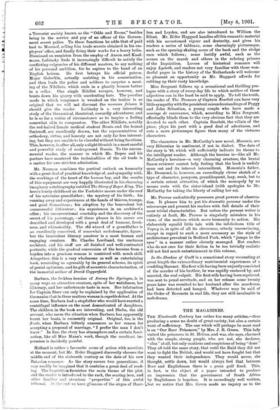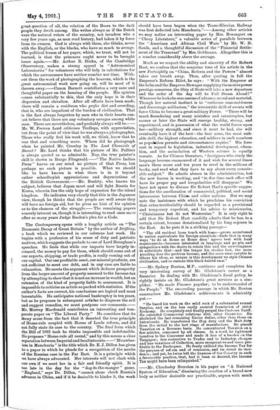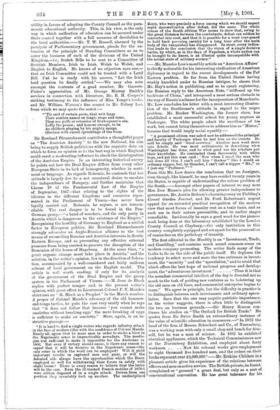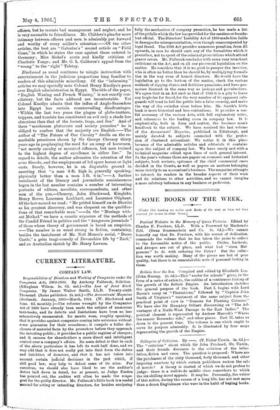THE MAGAZINES.
THE Nineteenth Century has rather too many articles,—thus producing a sense no doubt of great variety, but also a certain want of sufficiency. The one which will perhaps be most read ,
is on " Our Boer Prisoners," by Mrs. J. R. Green. This lady visited the prisoners in St. Helena, and was, she says, charmed with the simple, strong people, who are not, she declares, "slim" at all, but only cautious and suspicious of being " done." They all told the same story, that until the Raid they did not want to fight the British, and would not have fought but that they wanted their independence. They would never, she
thought, settle down, but would always feel that between
Boer and Englishman there is a great gulf fixed. This, in fact, is the object of a paper intended to produce an impression that the government of South Africa by Englishmen is hopeless. It is exceedingly well written, but we notice that Mrs. Green made no inquiry as to the
great question of all, the relation of the Boers to the dark people they dwelt among. She writes always as if the Dutch were the natural riders of the country, not invaders who a very few years ago, as men read history, had taken it by force from its owners. God is always with them, she thinks, never with the English, or the blacks, who have so much to avenge. The political lesson of her paper, which, we trust, will not be learned, is that the prisoners ought never to be brought home again.—Mr. Arthur R. Rinks, of the Cambridge Observatory, makes a strong appeal in "Astronomical Laboratories" for volunteers who will help in calculations for which the astronomers have neither number nor time. With- out them the work of photographing the heavens, which is the great astronomical work now going on, will be most of it thrown away.—Canon Barnett contributes a very sane and thoughtful paper on the housing of the people. His opinion comes substantially to this, that the only hope is in their dispersion and elevation. After all efforts have been made, there will remain a residuum who prefer dirt and crowding, that is, who are impatient of the burden of civilisation. That is the fact always forgotten by men who in their hearts can- mot believe that there are any voluntary savages among white men. There are nevertheless, and probably always will be.
Mr. W. Frewen Lord criticises Trollope, with appreciation, but from the point of view that he was always a photographer. Those who really feel his work will, we think, know that he was that and something more. Whom did he photograph when he painted Mr. Crawley in The Last Chronicle of Barset ? Mr. Lord thinks that his picture of Mr. Palliser is always quoted as so admirable. Nay, the true painter's skill is shown in Burgo Fitzgerald.—" The Native Indian Press " leaves on our mind no picture of that Press, but perhaps no such picture is possible. What we should like to have known is what there is in it beyond rather schoolboyish appreciations and depreciations of the British Government. —Mr. Bnshby, who knows his subject, believes that Japan must and will fight Russia for Korea, wherein lies the only hope of expansion for the island kingdom. He indicates very clearly that this is the Japanese -view, though he thinks that the people are well aware they will have no foreign aid, but he gives no hint of his opinion as to the chances of the struggle.— The remaining papers scarcely interest us, though it is interesting to read once more after so many years Judge Emden's plea for a Code.
The Contemporary opens with a lengthy article on " The Economic Decay of Great Britain" by the author of Drifting, a book which we reviewed in our columns last week. He begins with a profession of his sense of duty and patriotic motives, which suggests the prelude to one of Lord Brougham's speeches. He finds that while our imports have largely in- creased, the money to pay for them, which should come out of our exports, shipping, or trade profits, is really coming out of our capital. Our one profitable asset, our mineral products, are not sufficient to meet our debt, and in any case are liable to exhaustion. He meets the argument which deduces prosperity from the larger amount of property assessed to the Income-tax by attempting to show that it is not an increase in wealth, but an extension of the kind of property liable to assessment. It is impossible to criticise an article so packed with statistics. If the author's facts are correct, his conclusions are logical and most lamentable. He anticipates national bankruptcy in ten years, but as he proposes in subsequent articles to diagnose the evil and suggest remedies, we must postpone our comments.
Mr. Murray Macdonald contributes an interesting and tem- perate paper on " The Liberal Party." He considers that its decay arose from the fact that it deserted the true principle of Home-rule coupled with House of Lords reform, and did not fully state its case to the country. The final form which the Bill of 1893 took he thinks impossible and indefensible. He proposes " Home-rule all round," and by this means a clear separation between Imperial and local interests.—" Micawber- ism in Manchuria" is the title which Dr. E. J. Dillon has given to a paper in which he pleads for a recognition of the merits of the Russian case in the Far East. It is a principle which we have always advocated. Her interests will not clash with our own if we meet her in a fair and friendly spirit. It is too late in the day for the " dog-in-the-manger " game. " England," says Dr. Dillon, " cannot alone check Russia's advance in China, and if it be desirable to hinder it, the work
should have been begun when the Trans-Siberian Railway was first deflected into Manchuria."—Among other articles we may notice an interesting paper by Mrs. Bosanquet on " Cheap Literature," a valuable series of parallels between the "American and African Civil Wars" by Mr. W. H. Sands, and a thoughtful discussion of the " Financial Settle- ment of the Transvaal" by Mrs. Goldmann. Altogether this is a number considerably above the average.
Much as we respect the ability and sincerity of Sir Robert
Hart, we confess that the sanguine tone of his article in the new Fortnightly on " China, Reform and the Powers " almost
takes our breath away. Thus, after quoting in full the Emperor's Reform Edict, he says : " With the Emperor at the helm and the Empress-Dowager supplying the motive power prestige conserves, the Ship of State will take a new departure and the order of the day will be Full Steam Ahead!" Wherever he looks he sees omens of advance, moral and material. Though her natural instinct is to "enthrone reasonableness
and discourage militarism," the irresistible drift of events will•
force China to become a great military Power. " There will be much floundering and many mistakes and catastrophes, but sooner or later the State will emerge healthy, strong, and experienced, and in possession of what the world forces upon her—military strength, and since it must be had, she will eventually have it of the best—the best arms, the •most suit- able drill, the highest education, and soldiers in' such numbers as population permits and circumstances require." His fore- cast in regard to legislation, industrial development, educa- tion, and the assimilation of Western science is equally roseate. As for Chinese literature, "foreigners who study the language become enamoured of it and wish for several times man's three score and ten years to revel in the millions of books, and read what they have to say about every conceiv- able subject." He admits abuses in the administration, but the new leaven is working, and " in due time each office will have its proper pay and irregularities will disappear." We have not space to discuss Sir Robert Hart's specific sugges- tions for the amelioration of commercial, political, and social intercourse between China, and other nations. But we may note the insistence with which he proclaims his conviction that extra-territoriality should be regarded as a provisional and temporary expedient, and his advice to missionaries,
"Christianise but do not Westernise." It is only right to add that Sir Robert Hart candidly admits that he has, to a certain extent, become denationalised by his long sojourn in the East. As he puts it in a striking passage- " The old resident loses touch with home—grows accustomed to native equivalents for foreign essentials—finds that in many ways to do at Rome as Rome does' agrees best with local requirements—becomes interested in language and people, and sympathises with the desire to retain this and the unwillingness to substitute that—and the longer his studies last, the more puzzling does the problem become, and the more unacceptable to others his ideas, so unique is this development we style Chinese civilisation, and so curious this black-haired race."
--Mr. Sydney Buxton, M.P., continues and completes his very interesting survey of Mr. Gladstone's career as a financier. In dealing with Mr. Gladstone's fiscal policy, he rightly insists on Mr. Gladstone's great services as a sim-
plifier. "He made Finance popular; to be understanded of the People." The succeeding passage in which Mr. Buxton
summarises Mr. Gladstone's achievements is admirably put:— "He based his work on the solid rock of a substantial annual Surplus, and on the less easily secured foundation of strict Economy. He completely and finally purged the Customs Tariff. He extended Commercial relations with other Countries. He abolished the last remaining Excise duties, other than those on.. Intoxicants. He transferred the Hop duty and the Malt duty, from the initial to the last stage of manufacture. He placeclo Taxation on a Revenue basis. He concentrated Taxition on a few articles, consumed by all classes. In a word, he lightened taxation to the Consumer and made it less of a burden on the Taxpayer; less restrictive to Trades and to Industry, cheaper and less vexatious of Collection, more recuperative and more pro- fitable to the Exchequer. He freely utilised the Income Tax for the purpose of reform and of remission, and in), roved its inci- dence ; and yet, he twice left the finances of the Cuuutry in such a favourable position, that, had it been so desired, the Income Tax might have been relinquished."
—Mr. Clondesley Brereton in his paper on " A National System of Education," dismissing the creation of a brand-new body as neither desirable nor practicable, argues with much ability in favour of adopting the County Council as the para- mount educational authority. This, in his view, is the only way in which unification of education can be secured under State control together with a full measure of devolution to the local authorities.—Mr. T. W. Russell, alarmed by the
paralysis of Parliamentary government, pleads for the ex- tension of the principle of Standing Committees so as to cover the business of each of the divisions of the United Kingdom,—i.e., Scotch Bills to be sent to a Committee of Scottish Members, Irish to Irish, Welsh to Welsh, and English to English. He knows of no objection save one,— that an Irish Committee could not be trusted with a Land Bill. Put he is ready with his answer, " Let the Irish land question be finally settled."—We may also note amongst the contents of a good number, Mr Garrett-
Fisher's appreciation of Mr. George Murray Smith's services in connection with literature, Mr. E. H. Cooper's striking testimony to the influence of Miss Yonge's books,
and Mr. William Watson's fine sonnet to Mr. Sidney Lee, from which we may quote the sestet :— " 'Tis said of certain poets, that writ large Their sombre names on tragic stage and tome, They are gulfs or estuaries of Shakespeare's sea. Lofty the praise ; and honour enough, to be As children playing by his mighty marge, Glorious with casual sprinklings of the foam.
8ir Rowland Blennerhassett contributes a thoughtful paper on "The Austrian Anxiety " to the new National, his aim being to supply British politicians with the requisite data on which to form an opinion as to the best way in which England
could exert a moderating influence to check the disintegration of the Austrian Empire. In an interesting historical survey he points out how the Dual Empire differs from every other European State in its lack of homogeneity, whether in senti- ment or language. As regards Bohemia, he contends that her attitude is largely due to a not unnatural desire to emulate the independence of Hungary, and further maintains that blause 19 of the Fundamental Law of the Empire of September, 1867—that relating to the rights of the - bitizens in the different kingdoms and countries repre-
• seated in the Parliament of Vienna—has never been loyally carried out. Bohemia, he argues, is not irrecon-
• cilable. The real danger is to be found in the Pan- German group,—" a band of wreckers, and the only party in Austria which is dangerous to the existence of the Empire." Recognising the hostility of Germany to England as a settled factor in European politics, Sir Rowland Blennerhassett strongly advocates an Anglo-Russian alliance as the best means of reconciling Russian and Austrian interests in South- Eastern Europe, and so preventing any effective external pressure from being exerted to procure the disruption of the Dominion of the house of Hapsburg. At the same time, " a great organic change must take place in Austria," and the • solution, in the writer's opinion, lies in the direction of federa- tion, accompanied by a well-considered and fairly uniform scheme of local government on the English model. The article is well worth reading, if only for its analysis of the government of the Dual Empire and the group system in the Parliament of Vienna.—M. Jean de Bloch replies with perfect temper and, in the present writer's opinion, with great effect to Lieutenant-Colonel F. N. Maude's strictures on " M. Bloch as a Prophet " in the March number.
A propos of Colonel Maude's advocacy of the old hammer- and-tongs tactics, he puts the case very neatly when he says
that " it does not follow that because ' you cannot make omelettes without breaking eggs' the mere breaking of eggs is sufficient to make an omelette." Here, again, is an in- ' structive passage :—
" It is bard to find a single writer who regards infantry attack in the face of modern rifles with the confidence of Colonel Maude. Nearly all agree that to mass men in order to strike a blow in the Napoleonic sense is impracticable nowadays. The needle- gun was sufficient to make it impossible for the Austrians in 1866. But even if victory should ensue, is there any reason to expect that it will be decisive in the Napoleonic sense—the only sense in which the word can be employed? Will it yield important results in captured men and guns, or will the defeated side always have the opportunities which the Boers • employed so well for withdrawing their forces in safety with slight losses ? There is every reason to believe that the latter will be the case. Even the ill-trained French mobiles of 1870-1 were seldom disposed of in a single attack. Driven from one position they invariably took up another. The undisciplined Boers, who were precisely a force among which we should expect rapid demoralization after defeat, did the same. The whole comae of the South African War seems to show that, owing to the great distance between the combatants, defeat can seldom be converted into rout, and that it is possible for a weak rear-guard to hold back pursuing cavalry for a long time after the main body of the vanquished has disappeared. In short, every indica- tion leads to the conclusion that the vision of a single decisive battle, by which, as in the days of Napoleon, a whole nation can be brought to its knees, is an illusion quite incompatible with the actual state of military science."
—Mr. Maurice Low'•s monthly article on "American Affairs' is chiefly noticeable for his interesting vindication of American
diplomacy in regard to the recent developments of the Far Eastern problem. So far from the United States having weakly knuckled under to Russian intrigue, he shows that Mr. Hay's action in publishing, and so to speak registering, the Russian reply to the American Note, " stiffened up the backbone of China," and interposed a most serious obstacle in the way of Russia's scheme for the incorporation of Manchuria. Mr. Low concludes his letter with a most interesting illustra-
tion of the Southerner's attitude in regard to the negro problem. Mr. Booker Washington, the , former slave, has established a most successful school for young negroes at
Tuskeegee. The white people admit the excellence of his work, but cannot bring themselves to address him as "Mister; because that would imply social equality
A prominent citizen was asked how he addressed the principal and faculty of Tuskeegee when he met him on the streets. He said he simply said Good-morning.' Another man went more into details. He was most enthusiastic in describing what Washington has done, and to what good use his scholars put their knowledge. He contrasted them favourably with white boys, and yet this man said : Now when I meet the man who has done all this, I can't call him " Booker " like I would an ordinary nigger, but, by thunder, I can't call a nigger "Mr.," so I just say " Professor." " From this Mr. Low draws the conclusion that no foreigner, even though, like himself, he may have resided twenty years in
the States, is capable of understanding the colour problem of the South.—Amongst other papers of interest we may note Mrs. Ivor Maxse's plea for allowing greater independence to
governesses, Mr. Austin Dobson's charming essay on Fielding's Covent Garden Journal, and Dr. Ford Robertson's urgent
appeal for an extended practical recognition of the modern view that most forms of insanity rest on a toxic basis, and as
such are in their nature preventible, and in earlier stages remediable. Incidentally he says a good word for the pioneer work being done at the laboratory established by the London County Council at Claybury,—the only institution in this country completely equipped and set apart for the prosecution of researches on the pathology of insanity.
The first editorial in the Monthly is on " Investment, Trade,
and Gambling," and contains much sound common-sense on modern company promoting. The writer finds many of the faults to lie on the side of the public itself. He deplores the tendency to select more and more the two extremes in invest- ment, the " security " and the " speoulation," and to avoid that which offers the best hope of national progress and develop- ment, the " adventurous investment." "Thus it is that the soundest commercial intellect of the day is directed not so much to the task of guiding new ventures as to bolstering up the old ones on old lines, and commercial enterprise begins to wane." We agree in principle, but the difficulty in practice is to distinguish between such investments and ordinary specu- lation. Save that the one may acquire patriotic importance, as the writer suggests, there is often little to distinguish the two on business grounds.—Sir Hemy Roscoe con- tinues his studies on " The Outlook for British Trade." He quotes from Sir Swire Smith an extraordinary instance of the value of scientific education in commerce :—" In 1873 the head of the firm of Messrs. Schuckert and Co., of Nuremberg, was a working man with only a small shop and bench for him-
self, but he was a man of science. In 1882 he exhibited electrical appliances, which the Technical Commissioners saw
at the Nuremberg Exhibition, and employed about forty workmen. . . . . Now his colossal works give employment to eight thousand five hundred men, and the orders on their
books represent over £4,000,000."—Mr. Erskine Childers in a pleasant article gives his experience of the relations between officers and men on active service. The British private, he found, complained or " groused " a great deal, but only as a. sort of conversational convention. He has great tolerance for his
officers, but he resents bad management and neglect, and he is very amenable to friendliness. Mr. Childers's plea for more intimacy between officers and men is admirably put forward and worthy of every soldier's attention.—Of the other articles, the best are " Gakatus's " second article on " Field Guns," in which he states the case against those ordered in Germany; Miss Sichel's acute and kindly criticism of Charlotte Yonge ; and Mr. G. L. Calderon's appeal from the " wrong" to the " right " Tolstoy.
Blackwood as usual continues to mingle instruction with entertainment in the judicious proportions long familiar to readers of this admirable miscellany. Of the " informing " articles we may specially note Colonel Henry Knollys's paean over English administration in Egypt. The title of the paper, "English Waxing and. French Waning," is not exactly con ciliatory, but the facts adduced are incontestable. Yet Colonel Knollys admits that the influx of Anglo-Saxondom into Egypt has certain countervailing disadvantages. ' Within the last two years the plague of globe-trotters, trippers, and tourists has constituted an evil only a shade less obnoxious than that of the locusts, frogs, and lice." And of these "mushroom plutocrats and society parasites" he is obliged to confess that the majority are English.—The author of "The Future of Our Cavalry" dwells on the re- markable prescience shown by Sir George Chesney thirty years ago in. prophesying the need for an army of horsemen, "not merely cavalry or mounted riflemen, but men trained to the highest degree of excellence in either line." In regard to details, the author advocates the retention of the acme blanche, and the employment of led spare horses or light carts. Surely, however, he is on disputable ground in asserting that "a man 6 ft. high is, generally speaking, physically better than a man 5 ft. 6 in."—A further instalment of the literary and journalistic reminiscences begun in the last number contains a number of interesting portraits of editors, novelists, correspondents, and other men of the pen,—Chenery, John Blackwood, Kinglake, Henry Reeve, Laurence Lockhart, and Laurence Oliphant. Of the last-named we read : " He prided himself on de Blowitz as his greatest discovery, and was eloquent on the qualifica- tions of that remarkable man."—In the "Musings with- out Method" we have a caustic exposure of the methods of the Candid Friend in politics and the " dangerous jeremiads " of those whose theory of government is based on suspicion. —The number is as usual strong in fiction, containing, besides the instalment of Mr. Neil Munro's serial, "Doom Castle," a grim tragi-comedy of Devonshire life by " Zack," and an Australian sketch by Mr. Henry Lawson.













































 Previous page
Previous page